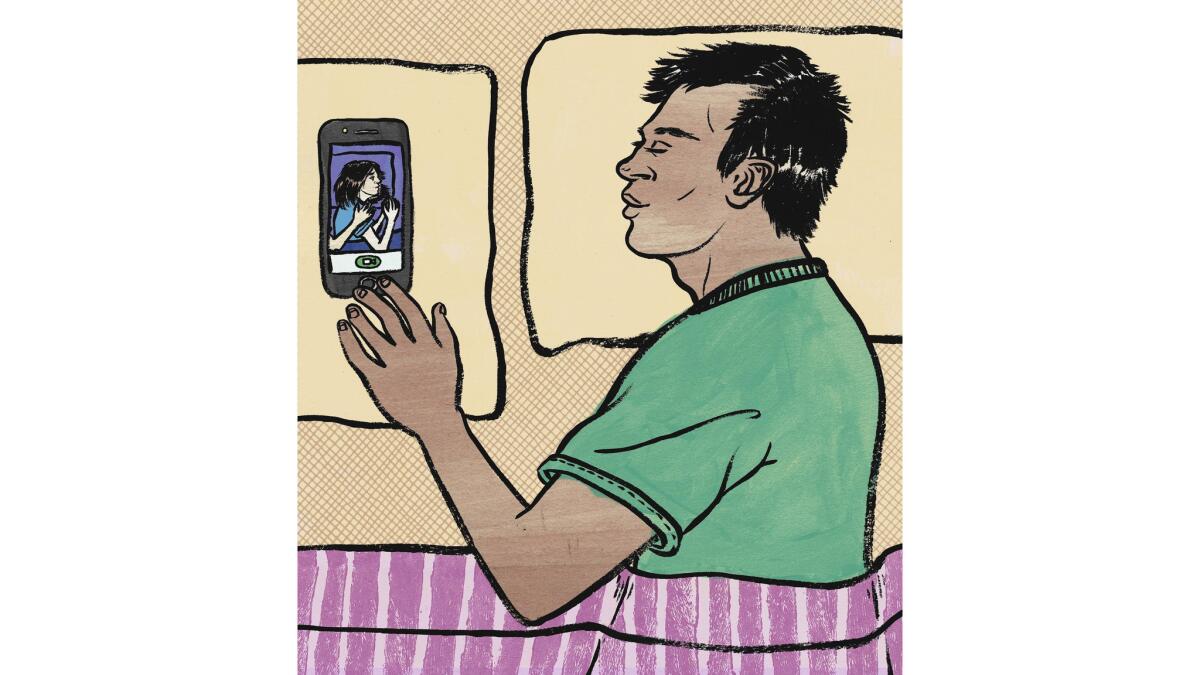L.A. Affairs: Swiping right on Tinder is a big yes to possibilities, but it’s also a yes to vulnerability

- Share via
Everyone has a strategy for using dating websites and apps. I don’t know if one is better than another, but I tend to use OKCupid and Tinder for my online romantic ventures. For OKCupid, I try my best to craft memorable, interesting messages to send to women. But with Tinder, my approach can best be described as a “dartboard” model: I shoot out as many feelers as I can and see what sticks.
I always swipe right.
I adopted this method early on, after I realized what a waste of time Tinder would be if I actually looked at and gave serious consideration to every single profile that popped up. So I swipe everyone to the right, see who swipes me the same way and go with what that turns up.
It works pretty well.
Are you a veteran of the L.A. dating scene? Share your story
Not that long ago, a woman who appeared to be somewhat exceptional popped into my Tinder matches. I didn’t know whether she thought I was worth getting to know or if she was also an always-right swiper, but she was beautiful, and her self-summary expressed her love of movies, jujitsu and animals, so I reached out. We had a lively conversation and soon shifted from Tinder messaging to frequent texting and Google chat sessions.
There’s another reason that I always swipe right, saying “yes,” besides saving time: It limits my emotional investment. From Facebook to comments sections everywhere, Web users are encouraged to pour their passion into their browsing. I’m not sure if we give parts of ourselves to technology or if it takes them from us, but the potential for emotional devastation multiplies once love, or the possibility of it, at least, comes into play. I’m naturally disposed to hopefulness and imagination, which is something that needs to be kept in check in the burgeoning stages of a relationship.
Past L.A. Affairs columns, and submission guidelines
We couldn’t meet in person because she was traveling with her family during a break from college. But we messaged every day, for hours at a time. We’d write about our pasts, about films and TV shows and books we liked. We swapped dumb jokes we both enjoyed. We sent pictures of our pets, of food we made, of ourselves pulling goofy faces. I liked her a lot. I was head over heels in “like” with her. I told her so, and she said the same to me. I loosened the leash on my hopefulness and it ran wild.
To date is to be vulnerable. Growing up introverted, it took me a while to accept that. Some people might still dismiss the emotional reality of online dating, but you put yourself out there with every message that you send, every heart icon you click, every “like” button you push. Even if you make nothing but a boilerplate message for every icebreaker (which is a terrible idea, by the way), there’s still that little prick of hope, that “maybe” or “what if” in the back of your mind when you send it.
The idea of communicating long distance for several months before getting to meet in person became rather romantic, a 21st century version of gentlemen and ladies courting via swooning letters. And then she told me she had a confession to make, one that made her horribly apprehensive. It turned out that she had a boyfriend.
Their relationship, she explained, was a tempestuous one. While they were in an “off” period, a friend encouraged her to sign up for Tinder and see who else was out there. She did, and she found, well, me. My stomach dropped as she blustered about how she didn’t expect any of this, and how sorry she was, and that she wasn’t going to break up with him or anything, but that she really did like me.
Anger. Disappointment. Embarrassment. It all rushed through for a moment, and when it was past, all that was left was my limited “knowledge” of a college student who’d inadvertently gotten into the kind of weird predicament that wouldn’t have been possible before the Internet. I believed her when she said she didn’t mean to hurt me. I could see how circumstance had snowballed on her. What use would it have been to lash out? She obviously felt bad about it. I tried my best to assuage her guilt. Still, our communication wasted away after that confession in a series of sporadic texts, like the remaining wall of a wrecked building giving way not long after a demolition.
To date is to be vulnerable. Even to try to get a date is to be vulnerable. And that can lead any of us into the strange haze of relationship ambiguity, a state of being that thrives in the current age. But that’s the place you have to dwell if you really hope to find someone. Which I do. In the meantime, I keep swiping right.
Schindel is a Los Angeles writer who specializes in film and pop culture at danschindel.com.
L.A. Affairs chronicles dating in and around Los Angeles. If you have comments or a true story to tell, write us at home@latimes.com


